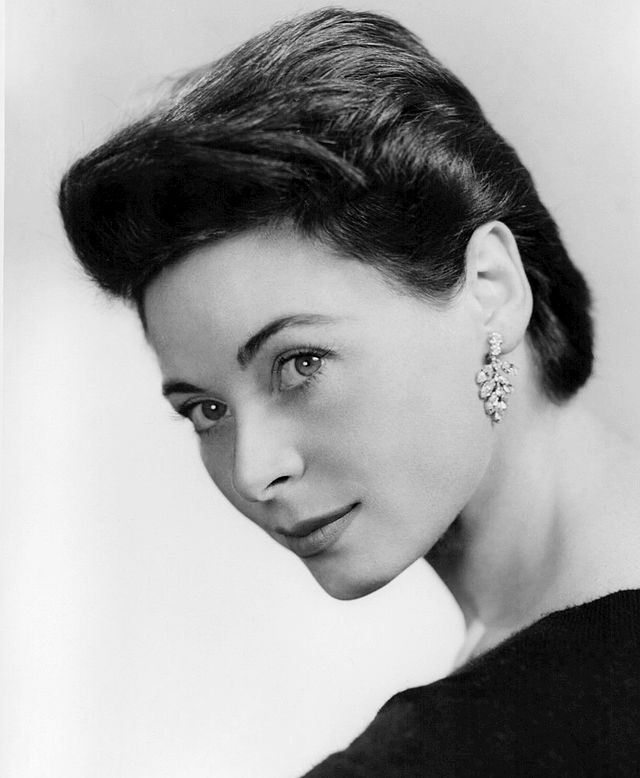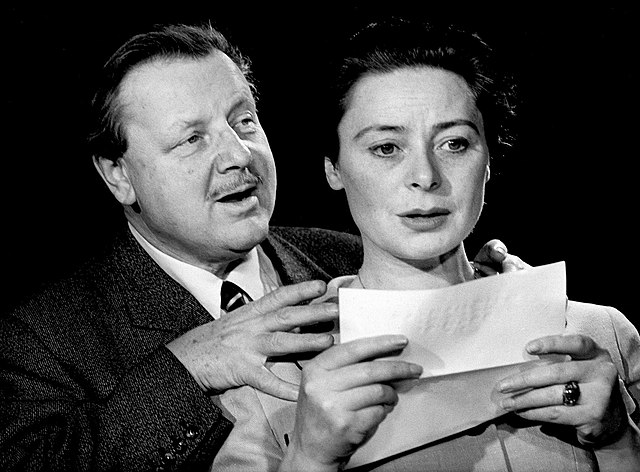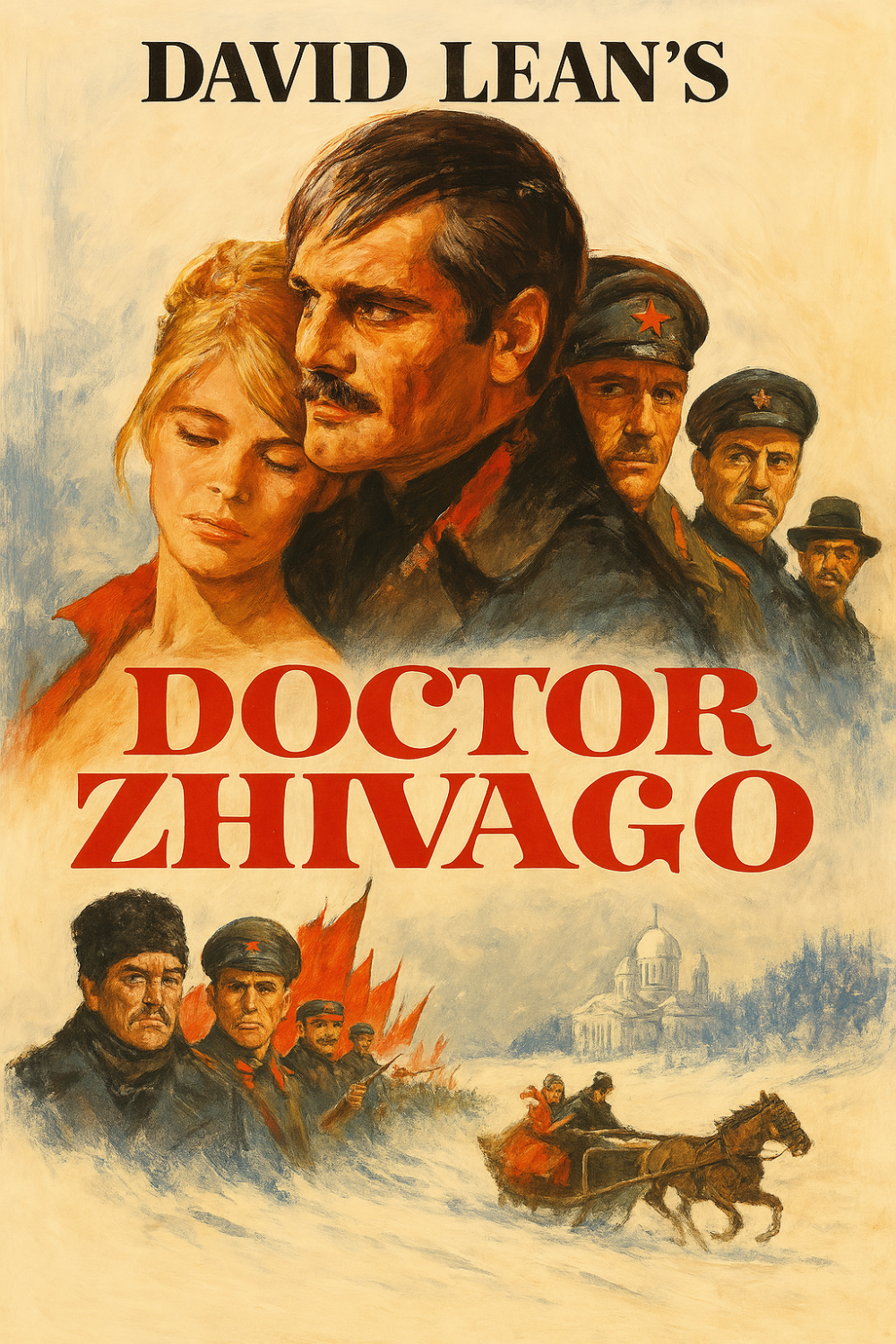Siobhan McKenna (1922 – 1986)
Biography and Movie Career
Siobhán McKenna was born on May 24, 1922, in Belfast, Northern Ireland, into a household that treasured learning, language, and culture. Her birth name was Siobhán Giollamhuire Nic Cionnaith, a name deeply rooted in the Irish language and tradition that would come to define so much of her identity. Though born in the city, her early childhood was shaped by rural rhythms and academic influences. When she was six, the family moved to Galway, where her father, Eoghan McKenna, accepted a position as a lecturer in mathematical physics at University College Galway. Her mother, Margaret (Gretta) O'Reilly, originally from County Longford, nurtured in Siobhán a sense of grace, eloquence, and fierce independence.
In their Galway home, Irish was the language of conversation, and young Siobhán absorbed it with the ease of a native speaker. This bilingual foundation gave her not just a practical skill, but a cultural voice. She was equally comfortable in the lyrical cadences of Irish as in the crisp tones of English, and it was in this duality that her early artistic spark was kindled.
From a young age, Siobhán displayed a precocious sensitivity and a fascination with performance. She attended the Dominican College in Galway and later went to school with the St. Louis Sisters in Monaghan. While academically gifted, it was the stage that truly called to her. She found her early footing in An Taibhdhearc, Galway’s Irish-language national theatre, where she began acting in her teens. With her commanding voice, magnetic presence, and a deep emotional range, she was destined to become one of the most formidable stage actresses of her generation.
Her path toward national and international fame was anything but accidental. After university, she joined the Abbey Theatre in Dublin, Ireland’s most prestigious national theatre. Her performances quickly began to draw attention. By the 1940s, she had established herself as a dominant figure on the Irish stage, bringing a rare combination of intellectual intensity and expressive vulnerability to her roles. She was especially admired for her interpretations of Irish classics and her commitment to Irish-language drama, but it was her portrayal of Joan of Arc in George Bernard Shaw’s "Saint Joan" that cemented her place in theatre history. When she took that performance to London in 1955, and then Broadway in 1956, critics and audiences alike were awestruck. Her presence was transcendent — not just playing a role, but channeling a spirit.
McKenna was no stranger to the cinema either. Though the stage remained her true love, she brought the same luminous strength to film. Among her most memorable screen roles were the Virgin Mary in "King of Kings" (1961), a quietly powerful performance that added an otherworldly dignity to the biblical epic; Pegeen Mike in "The Playboy of the Western World" (1962), a role she had honed on stage; and Anna in David Lean’s epic "Doctor Zhivago" (1965), where she played with controlled emotion opposite some of the era’s biggest stars. These performances showcased not only her beauty and charisma, but her deep intelligence and control as an actress.
Despite the glamour of international acclaim, McKenna remained deeply grounded. In 1946, she married fellow actor Denis O’Dea, a gifted performer in his own right. Their marriage was both a partnership of love and art — two souls committed to the craft of theatre. They had one son, Donnacha O’Dea, who would later make a name for himself as an Olympic swimmer and a professional poker player — a unique path that no doubt delighted his fiercely independent mother.
McKenna was a woman of profound convictions. Passionate about Irish culture, language, and heritage, she saw acting as more than entertainment — it was a form of cultural preservation and political expression. She continued to perform in Irish-language theatre throughout her career, and she gave voice to the stories and struggles of her people with clarity and grace.
Her final years were marked by continued artistic brilliance. In 1985, she gave a haunting performance in "Bailegangaire" by Tom Murphy, playing an old woman slipping into dementia while clinging to memories of love and loss. It was a role that seemed almost written for her, and she brought to it all the sorrow, strength, and poetic insight that defined her career.
Tragically, just a year later, on November 16, 1986, Siobhán McKenna passed away in Dublin at the age of 64. The cause of death was lung cancer, a cruel irony for someone whose voice had moved so many. She was laid to rest in Rahoon Cemetery in County Galway, the land that had shaped her soul and to which she now returned.
Siobhán McKenna left behind a legacy not just of great performances, but of cultural devotion, artistic integrity, and unyielding courage. In a career that spanned decades and continents, she remained ever faithful to her roots — an Irishwoman in every breath, a star in every light.
Her name still echoes on stages and in hearts. Not simply an actress, Siobhán McKenna was a force of nature — and an eternal voice of Ireland.
Siobhan McKenna’s Acting Style
Siobhán McKenna’s acting style was a masterclass in intelligence, emotional depth, and vocal command — all rooted in a profound sense of cultural authenticity. She was not a showy actress, but a deeply expressive one, working from the inside out. Her performances did not rely on flamboyant gestures or dramatic excess, but instead drew from a well of carefully restrained intensity and emotional truth.
At the heart of McKenna’s approach was her voice — not merely its tonal beauty, but the precision, rhythm, and purpose with which she wielded it. She had one of the most commanding voices on the stage, resonant and clear, capable of soaring with poetic language or falling into hushed intimacy. This wasn’t just a natural gift — it was finely honed through years of theatre work, much of it in Irish, which demanded musicality and linguistic awareness. Her voice could carry the weight of myth, sorrow, wit, or divine strength, often within a single performance.
Her physical presence was marked by a quiet strength. Even in stillness, McKenna radiated energy. She moved with deliberation, never idle or uncertain, using her posture and gaze to define character. Whether she was playing Joan of Arc, Pegeen Mike, or the Virgin Mary, she brought an innate dignity and fearlessness that gave even her gentlest characters an undercurrent of steel.
McKenna was an actress who lived within the text. She understood words — their meaning, music, and muscle. She was a natural interpreter of poetic and lyrical writing, capable of turning monologues into intimate revelations or public declarations. Her work with Irish dramatists, as well as Shakespeare and Shaw, reflected her ability to lift language off the page and embed it deep within the soul of a character.
Emotionally, she leaned toward understatement over display. Her power came not from tears or shouting, but from internal struggle revealed in flickers — a clenched jaw, a softened voice, a moment of breath held just too long. She often portrayed women with deep wells of feeling — spiritual, maternal, political, or romantic — and she communicated those feelings through restraint and subtle control, which only made the emotional impact more powerful.
What also distinguished McKenna was her intellectualism. She brought a sharp mind to every role, probing motivations, backstory, and subtext. Her performances felt thought-through and complete, as though she understood not only the lines but the centuries of history or myth that had shaped her character.
In sum, Siobhán McKenna’s acting style was a fusion of emotional precision, vocal mastery, physical stillness, and fierce intellect. She was an actor of integrity and inner fire, never trying to impress but always compelling — a true artist whose every gesture felt deliberate, every word hard-won. Her legacy is not just in the roles she played, but in the way she played them: with soul, with substance, and with truth.
Documentary on Siobhan McKenna
Memorable Film Lines of Siobhan McKenna
As the Virgin Mary in "King of Kings" (1961):
• Virgin Mary: "I am alone now, share my table."
Mary Magdalene: "I am a woman of sin."
Virgin Mary: "You will share my table."
Mary Magdalene: "I have done much evil."
Virgin Mary: "Child, God knows evil exists as well as good. Just as there is light and darkness. Evil exists that we may be the better for it."
• Camel Driver: "Your son?"
Virgin Mary: "Yes."
Camel Driver: "And, does He like being a carpenter?"
Virgin Mary: "Yes, He does."
Camel Driver: "There's a big world outside this garden. Do you want Him to see it?"
Virgin Mary: "He will see it soon enough."
Camel Driver: "Let me take Him with me. I'll pay you well. I can use a lad like that to help me with my caravan."
Virgin Mary: "No. Someday, He will leave me, but someone else will call Him."
Camel Driver: "And who will that be?"
Virgin Mary: "My son will know Him when He comes."
As Anna in "Doctor Zhivago" (1965):
• Anna: "But, Boris, this is genius."
Medical Professor: "Really? I thought it was Rachmaninoff. I'm going for a smoke."
Awards and Recognition
Theatre Awards:
• Tony Award Nominations:
o 1956: Nominated for Best Actress in a Play for her portrayal of Miss Madrigal in The Chalk Garden.
o 1958: Nominated for Best Actress in a Play for her role as Margaret Hyland in The Rope Dancers.
• Drama Desk Award:
o 1971: Received the Outstanding Performance award for her solo show Here Are Ladies, which showcased her versatility through readings from works by renowned Irish authors.
• Evening Standard Theatre Award:
o 1955: Honored with the inaugural Best Actress award for her compelling performance in the title role of George Bernard Shaw's Saint Joan.
Cultural Honors:
• Éire Society of Boston Gold Medal:
o Awarded the Gold Medal by the Éire Society of Boston in recognition of her significant contributions to promoting Irish cultural achievements.
Posthumous Recognitions:
• American Theater Hall of Fame:
o 1988: Inducted into the American Theater Hall of Fame, honoring her enduring impact on the performing arts.
• Siobhán McKenna Theatre:
o In her birthplace of Belfast, the Siobhán McKenna Theatre was established, serving as a lasting tribute to her legacy and influence in the world of theatre.
• University of Galway Scholarship and Lecture Series:
o 2024: The University of Galway launched the Siobhán McKenna Scholarship Award and an accompanying lecture series to support and inspire the next generation of theatre practitioners. This initiative underscores McKenna's lasting influence on the arts and her commitment to nurturing emerging talent.
Siobhán McKenna's legacy is further preserved through the Siobhán McKenna Archive housed at the University of Galway's Hardiman Library, offering invaluable insights into her life and career.
Siobhan McKenna Movies
• 1947: "Hungry Hill"
McKenna portrayed Kate Donovan in this drama based on Daphne du Maurier's novel, which chronicles the feud between two families over a copper mine in 19th-century Ireland.
• 1948: "Daughter of Darkness"
In the role of Emmy Baudine, McKenna played a disturbed young woman whose beauty leads to tragic consequences in a small Irish town.
• 1949: "The Lost People"
McKenna appeared as Marie in this drama about a group of displaced persons in post-World War II Europe, highlighting their struggles and interactions.
• 1951: "The Adventurers"
In this adventure film, McKenna played Anne Hunter, contributing to a narrative filled with intrigue and exploration.
• 1961: "King of Kings"
McKenna took on the role of Mary, the mother of Jesus, in this epic retelling of the life of Christ, emphasizing her serene and compassionate portrayal.
• 1962: "The Playboy of the Western World"
Reprising her acclaimed stage role, McKenna played Pegeen Mike, a spirited innkeeper's daughter entangled with a mysterious stranger claiming to have killed his father.
• 1964: "Of Human Bondage"
As Nora Nesbitt, McKenna featured in this adaptation of W. Somerset Maugham's novel about a medical student's destructive relationship with a waitress.
• 1965: "Doctor Zhivago"
McKenna portrayed Anna Gromeko, the wife of Alexander Gromeko, in this epic romance set against the backdrop of the Russian Revolution, focusing on the life of poet and physician Yuri Zhivago.
• 1970: "Philadelphia, Here I Come!"
In the role of Madge, McKenna appeared in this adaptation of Brian Friel's play, exploring the emotional turmoil of a young Irishman contemplating emigration to America.
• 1984: "Memed, My Hawk"
McKenna played Iroz in this adventure drama about a young man's rebellion against oppressive rulers in Turkey.



